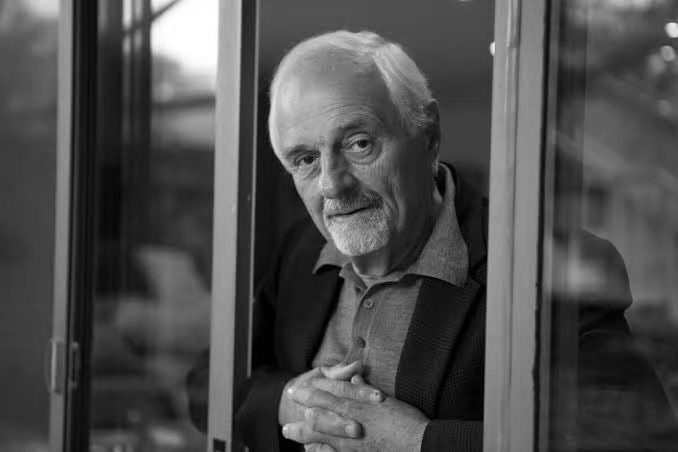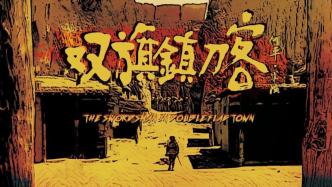
Ted Kotcheff, a famous Canadian director known for films such as "Outback", "The Apprenticeship of Buddy Kravitz", "First Blood" and "The Boss Goes on Vacation", passed away on April 10 local time at the age of 94. Kotcheff's family confirmed the news of his death, but did not disclose the specific reason.

Ted Kotcheff
The masterpiece "Inland Horror" has been hidden for forty years
Although Ted Kotcheff's directorial career spans more than sixty years, it is not very smooth. He started out as a television director in his early years. When he went to the United States as a young man, he ran into the gun of McCarthyism and was deported, and his road to Hollywood was completely cut off. After moving to London, Kotcheff continued to work in the television field. After he turned forty, he gradually had more opportunities to shoot big-screen works.
However, the value of his early masterpieces such as "Inland Horror" and "The Apprenticeship of Buddy Kravitz" has never been fully explored. Although he was able to develop in Hollywood and directed "Rambo" which was a box office hit, he resolutely refused the sequel contract for his own beliefs.

Stallone (left) and Kotcheff on the set of "First Blood"
Ted Kotcheff was born on April 7, 1931 in Toronto during the Great Depression. His parents were Macedonian immigrants from Bulgaria. After graduating from the University of Toronto with a degree in English literature, he joined the Canadian Broadcasting Corporation (CBC) and started as an ordinary staff member on the TV show stage. Within a few years, at the age of 24, he became the youngest TV director in Canada. However, Kotcheff always wanted to go abroad to gain experience, so he went to London, England in 1957, starting a life in a foreign country for more than ten years.
The reason why Kotcheff did not choose to pursue his ambitions in the United States like most of his Canadian counterparts was due to an inexplicable experience he had not long after he started working. In 1953, he went to the United States for the first time in his life to watch a Broadway show. Unexpectedly, he was arrested by border officials when he returned home. It turned out that the Canadian police had informed the FBI of his participation in a left-wing reading club in advance. Kotcheff was therefore labeled a "communist" and deported. He was not allowed to re-enter the United States until 1972.
After arriving in London, Ted Kotcheff continued to make a living by directing TV series and producing programs. It seemed that he was just overwhelmed with "compositions", but it honed his directing talent and enabled him to learn how to flexibly deal with various themes and types. "I was doing a one-hour drama anthology program every week, shooting dramas one week, comedies one week, and historical dramas one week. You can try out what you are good at." Kotcheff said later.

"A Beautiful Lady in a Golden House" depicts the journey of a couple from loving each other recklessly to hating each other.
At the same time, Kotcheff also got the opportunity to switch from the screen to the big screen. Tiara Tahiti, starring James Mason and John Mills, and Life at the Top, starring Laurence Harvey and Jean Simmons, both received good reviews. Even after that, the famous Italian director Antonioni, who had just finished filming Blow-Up, asked him for some suggestions so that he could cut 20 minutes. "The suggestions I gave were about deleting 18 minutes of content, and surprisingly, he almost completely adopted them in the end."

"Inland Horror" was shortlisted for the main competition unit of the Cannes Film Festival.
In 1971, Kotcheff's Wake in Fright was shortlisted for the main competition unit of the Cannes Film Festival. Although it did not win the award, this film shot in Australia fully demonstrated how vulnerable civilization would become in an extreme environment where violence could be unleashed, and how so-called masculinity would evolve into a collective unconsciousness and suppress human nature. A montage of kangaroos being hunted in a fast-cut sequence in the film is rare in its bloodiness and brutality in film history (although it is noted at the end of the film that this shooting was assisted by professional hunters).
Outback is regarded as the pioneering work of the Australian "New Wave". Peter Weir, who later directed masterpieces such as Picnic at Hanging Rock and The Truman Show, also studied in the crew. It was expected to be Kotcheff's first work to shine in the world film scene, but the distribution company soon went bankrupt, and the film was stored in the warehouse for forty years. It was not until the 2009 Cannes Film Festival that this masterpiece was seen again. When Martin Scorsese gave a guided tour of the film, he said that it "surprised me so much that I was speechless."

Kotcheff on the set of "The Apprenticeship of Buddy Kravitz."
He was unwilling to direct the sequel to Rambo because he opposed the Vietnam War
In 1974, Kotcheff returned to his hometown after a long absence and filmed "The Apprenticeship of Duddy Kravitz". Starring Richard Dreyfuss, who became famous for "American Graffiti", the film tells the story of Buddy, a young man from a working-class Jewish family, who climbed up step by step by any means necessary to gain socially recognized success.

"The Apprenticeship of Buddy Kravitz" won the Golden Bear Award, the highest honor at the Berlin Film Festival.
At the Berlin Film Festival that year, "Buddy Kravitz's Apprenticeship" won the Golden Bear Award for Best Film. This was the first important award Kotchev won, and it can be said to be the most important award in his entire directing career; more importantly, it became Kotchev's stepping stone to Hollywood. He once wrote in his memoir "Director's Cut: My Life in Film" (2017): "Buddy Kravitz's Apprenticeship is the axis of my career and almost the axis of my life."
After shooting several mainstream commercial films in Hollywood, such as Fun with Dick and Jane, Kotcheff's first box office hit was First Blood, released in 1982. The film cost about $16 million and topped the North American box office for three weeks after its release. The global box office exceeded $125 million (about $317 million today), and it also created the action movie IP "Rambo".

"First Blood" created the action movie IP "Rambo".
It is worth mentioning that three years later, in 1985, Rambo was introduced to China as an "internal reference film" and screened in a small range. With the popularization of videotapes, the film became the enlightenment of Hollywood action films for a generation of Chinese audiences.
Although Rambo undoubtedly brought Kotcheff's directorial career to a peak, he refused to direct the sequel. In 2016, he recalled in an interview with Filmmaker magazine: "They showed me the script for the sequel, and I said, 'In the first movie he didn't kill anyone, in this one he's going to kill 75 people.' This sequel is like singing an ode to the Vietnam War, which I think is one of the stupidest wars in history. 55,000 young Americans died, and many veterans committed suicide. I can't make a movie like that. Even though that sequel made $300 million at the box office, I could have become very rich."

The black comedy The Boss Goes On Vacation is now a cult classic.
In 1989, Kotcheff directed the black comedy Weekend at Bernie's, which also received good box office success. The film tells the story of two insurance company employees who discover that their boss has been murdered. In order to enjoy a rare holiday party life, they try their best to disguise their boss as being alive. However, Kotcheff was also reluctant to direct a sequel, saying with a smile that he had "used up all the jokes about the dead." After the rise of the cult film trend, this old film was once again re-opened and appreciated by the younger generation of movie fans.
Kotcheff's longtime friend and producer Peter Bart commented on him, "Ted Kotcheff injects real wisdom and humanity into his films. He can make us laugh at the weaknesses of human nature through "The Boss Goes on Vacation", and he can also evoke sympathy for the fragility of life in "The Money Robbers". No matter where he works, he always has a deep humanistic concern and can win the great love of the actors."
Towards the end of his career, Kotcheff was best known for his tenure as showrunner on NBC's long-running series Law & Order: SVU, which ran for 13 seasons.

In 2017, Kotchev published his memoirs, Director's Cuts: My Life in Film.
After retirement, in addition to his memoir "Director's Cut: My Life in Film", Kotcheff also published three poetry collections, and spent his later years with his Chinese wife Laifun Chung. Their daughter Alexandra is also a film director; their son Thomas is a pianist who has composed music for many films. His first wife was British actress Sylvia Kay, with whom he worked in "Inland Horror".
